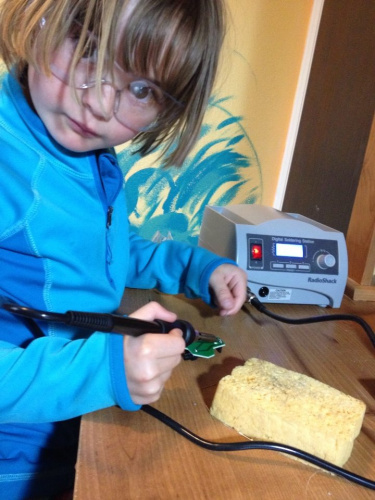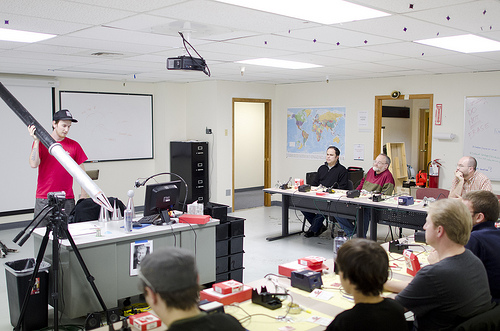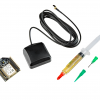In this post, Dr. Kristi Pikiewicz discusses introducing some of her therapy clients to soldering as a way to calm and focus themselves. Yet another reason to involve kids in DIY projects? Here's more from her:
Yes, I’m a proud mamma watching my daughter involve herself fully in an activity that is far beyond her years and non-stereotypical for her gender. But I’m also a PhD psychotherapist and school psychologist here in Boulder. And I couldn’t help but notice that soldering had helped my sometimes-a-particle, sometimes-a-wave daughter achieve an emotional state that is really, truly hard for her.
Kristi's daughter Kestrel hard at work (and with proper eyewear!).
Was it just her or is there something about the activity that could help other kids?
I work with a three-part strategy that helps kids (and adults...) learn to calm their bodies and minds. First, I try to help them realize what it feels like to be elevated or dysregulated – how does it feel a frenzied “10” on the scale of emotional regulation? And how does it feel to be more regulated, say below a “5”? The second step is working to discover strategies that can help move lower on this scale – to get from a 10 back into a more manageable range. And the third step is adding the components of self-awareness and language – being able to say, “I’m starting to feel [blank], I really need to [blank].”
SparkFun's Director of Education, Dr. Lindsay Diamond, teaching soldering at a Maker Faire in 2010. (note: This is an old photo - we try to be much more careful about safety these days!)
By far, the most difficult part of this process is the first step. How often do you have those moments of clarity in which, just for a split second, you look from outside yourself to find that you’re gritting your teeth with stress, or spinning your mind in anger, or clenching your shoulders high with tension, or even vibrating with excitement (and not in the immediate aftermath of a trip to Ozo...)? Even as adults it can be tremendously difficult to see the forest through the trees – it can be desperately hard to recognize and monitor our emotional states. And we’re supposed to know better!
Now imagine how hard this awareness is for a child. Nothing you say can help a child truly know how these emotional states feel in their bodies. No wall chart with cartoon faces of emotions or silly board game that “leads” from angry to calm can allow a child to experience these very real states of being. I know how to help a child process an elevated state: we can work carefully with traumatic memories or I can encourage struggles in the therapy room with challenging toys.
One of my clients finds calmness with my Labrador. For another, it’s sifting kinetic sand. But for some kids (and, again, some adults...) it can be nearly impossible to find an exercise or game or activity that creates real, profound, organic calmness.
So I’ve started introducing soldering with some of my clients – just the ones that show interest and have been difficult to reach in other ways. Here’s the thing: if you’ve ever done a soldering kit (SparkFun or another), you know that it’s impossible to get anything done without steady hands and a pinpoint focus on the tiny parts in each step. Deeply involved in a soldering kit, I’ve seen tricky clients find a level of focus that I’ve been unable to help them reach in any other way.
Soldering genius Tyler Talmage gives a few soldering pointers during a class at SparkFun.
That’s the first step, this true feeling of focused calm. From this point forward in our journey together, this feeling can provide a known target that we can aim for. I don’t expect my young clients to carry a soldering iron and a pair of clippers in a fanny pack wherever they go, but once they know this experience of self-regulation, we can work to find it in other ways. And for absolutely everyone I’ve ever worked with, this state just feels good. True focus, precision and selfless involvement may be something kids (and adults) have never felt before.
Take it for what it’s worth: just an idea. But my daughter and now my clients have helped me to place soldering into my quiver of ideas that can artificially create a first experience of calmness that can create a template for self-regulation moving forward.
More About Kristi:
Dr. Pikiewicz earned her PhD in Clinical Psychology at Pacifica Graduate Institute in Carpinteria, CA. She completed pre-doctoral training at the Nan Tolbert Nurturing Center in Ojai, CA, and her post-doctoral internship at the Boulder Institute for Psychotherapy and Research. At both sites, Dr. Pikiewicz worked with a range of adult, adolescent and child clients in individual, couple, family and group settings. She also holds a B.S. with a major in environmental science from Allegheny College and a elementary education teaching credential from Western Washington University. Dr. Pikiewicz now works with adult, adolescent and child clients in Boulder, Colorado.
And just in case this post has inspired you to learn soldering, here are a few tutorials to get you started!
How to Solder: Through-Hole Soldering
This tutorial covers everything you need to know about through-hole soldering.











Since everyone seems to be making safety criticism comments, I would like to mention the biggest danger is using any soldering iron with the radioshack logo!
You're all correct in wondering about the lack of safety glasses. Admittedly, while not an excuse, this photo is from before our Department of Education existed. I was working in Production and we had a bit more of a risk neutral nature about us. We were new at the whole teaching thing and mistakes were made. Since 2011-2012 we've been requiring all instructors and students to wear safety glasses. We were lucky to never have any incidents and we are grateful for that. You can all sleep at night knowing we do take safety seriously and have come a long way since our renegade days of yore.
It is also highly unlikely that the iron was on at this point as I was demonstrating the mechanics of how to solder. We do our best to empower the students to tackle all soldering and troubleshooting themselves rather than commandeering the iron to fix things. Regardless, I should have been wearing glasses. Period.
I agree about the use of safety glasses while soldering, as there have been a few times when I've been soldering and parts have slipped, causing small amounts of solder to be flung into the air, a few times towards my head. I always wear them now.
Curiously, I don't really see any mention of proper ventilation while soldering. Even if you are using lead-free solder, the fumes are still toxic, and young children like the girl depicted in the photo are especially vulnerable. It is easy enough to provide adequate ventilation. I have a 440 CFM blower fan in my shop which I've connected a length of dryer hose to, and it completely sucks out any fumes that come off while I'm working. Maintaining good air quality while working on projects is a great lesson to instill on young children!!
My boys learned to solder when they were 4 or 5. For myself, the rare times I get to solder a kit together, it's a nice way to relax. I explained it to my wife as "knitting, for geeks".
I have to admit, I have never worn safety glasses while soldering. I have never seen or heard of anyone using them either. Not at university, not in industry.
Is this a legal requirement in the U.S? I live in Europe, so I suppose our regulations are different.
Why isn't your director of education wearing safety glasses too?
When I used to work as an apps engineer, I'd hide in the lab and repair eval kits from the bone pile. Desoldering and replacing a bad 208 TQFP is surprisingly relaxing once you've moved beyond being intimidated by SMT. It was a good way to unwind after dealing with difficult customers and office drama.
Ok, I know Kristi is only posing for the photograph, and I can't tell if the soldering iron is actually powered on, but she should be watching what she's doing or she'll burn herself!
and she should probably be using a sparkfun soldering station, along with sparkfun safety goggles (and why not a sparkfun t-shirt or lab coat), but that's just me.
OMG it's.... Radio Shack!!!
Well... I guess they need the help, and Radio shack has solved some gotta have it now moments, especially since they are carrying Arduinos. Fyi, they really need to align the rest of their electronic offerings with the dyi offerings. They... just don't match :(.
shhhh! don't give them business advice.
Heh if you're worried about Radio Shack taking SparkFun's business, you would never be in business. Hands down there is no way they could add the value to the marketplace you do (well, unless you all bought them [or just a few stores... in WA?], and called it Radio Sparkfun Shack. Or... SparkShack.
Really you only need to buy one store in the Seattle area to make me happy :).
I would totally be down for a Sparkfun brick and mortar store. Not only would it be a store, but it would be an environment where people of all ages could come and work on their projects. There would be a bunch of workstations with tools (and computer maybe?) at each one that are free to use. I always find myself making several different orders from Sparkfun while working on a project because I never think things through completely. Having a store and a workshop in the same place would = $$$BIG$$$ for Sparkfun. =)
I think brick and mortar is just too much overhead, seriously. I envision a successful fork of this idea would be like RedBox and Bitcoin ATMs, a Sparkfun Vending machine, at the more popular electronic hacker/maker spaces and some universities. They could even easily convince customers like us (the hardcore ones that read every article and comment, hah) to do the stocking for them, in return for small ($50-100?) digital vouchers of free products, (that could be used online or in the vending machine)
The best way to do this would be with bitcoin so the guy who stocks the machine doesn't have to deal with money. But alas, we don't wanna run into legal issues with sparkfun registering to be a money transmitter in every state, hopefully before this idea completes itself, the laws will clear up and Lawsky will stop using Windows XP.
Someone asked when is the last time a soldering iron spit in my face, well that would be YESTERDAY shortly after posting my comment. Soldering a 12 AWG wire into a terminal and boiling flux bubble shot out some little particles of hot solder. And as to the comment about safety glasses in Europe, having spent some time in Germany and Hungary teaching and repairing equipment, there is most assuredly a REQUIREMENT for safety glasses AND positive ventilation of the fumes, AND a requirement to deal with the dross and other ruminant's of the soldering process. When we teach students here at our college, safety glasses are mandatory for almost every activity, including powering up uncovered circuit boards, its no fun pulling chunks of blow up capacitors out of one's face. Accidents happen, its far easier to work safely than to recover from an accident AND fill out all the resulting paperwork especially in the workplace (can you spell OSHA?)
Wow. I've taught all my kids to solder and never had them wear safety glasses. I consider myself pretty safety conscious, heck I was on the safety committee at work and worked hard to get a mandatory safety glasses while in the shop policy.
Are you teaching the kids to flick the iron around or something?
Seriously, staged or not, soldering iron in hand ONLY after safety glasses over eyes. And in my labs no hand or wrist jewelry allowed! It is ALWAYS important when educating to set the correct example, ALWAYS.
Seriously, when was the last time a soldering iron spit in your face?
About two weeks ago. Probably happens every 6 months or so, working with wires into audio connectors etc. Soldering without glasses feels as foreign to me as driving a car without a seatbelt.
In my face, actually never. (I have had part leads fly in that direction while clipping the excess with cutters though!). However I have had excess solder drip off and land in my lap (while wearing shorts!) I guess you should always wear long pants (and NO SANDLES!) or an apron while soldering! Also don't solder anything that has been glued into place with superglue or you will melt out your eyes from the fumes!
I wear them to help keep fumes out of my eyes (I know breathing them in is bad too, but I can just hold my breath when soldering directly over something). The comment I made above was mostly just kidding because they pointed out that the little girl was wearing them.